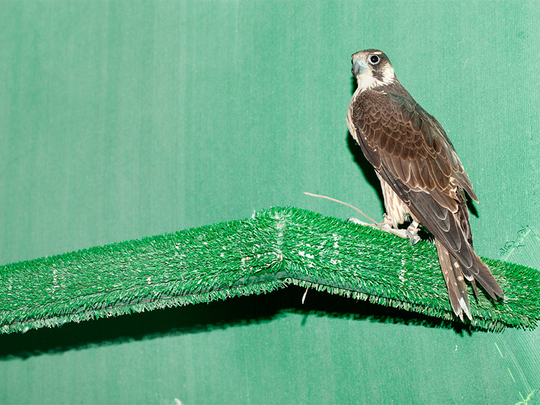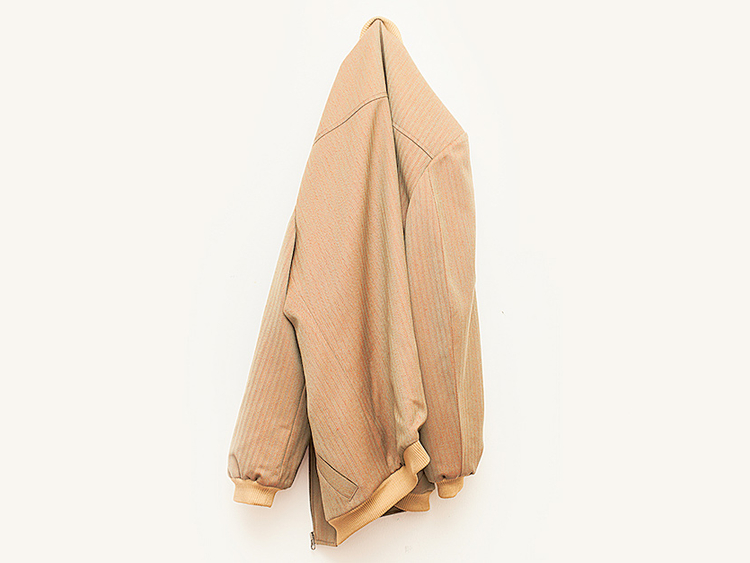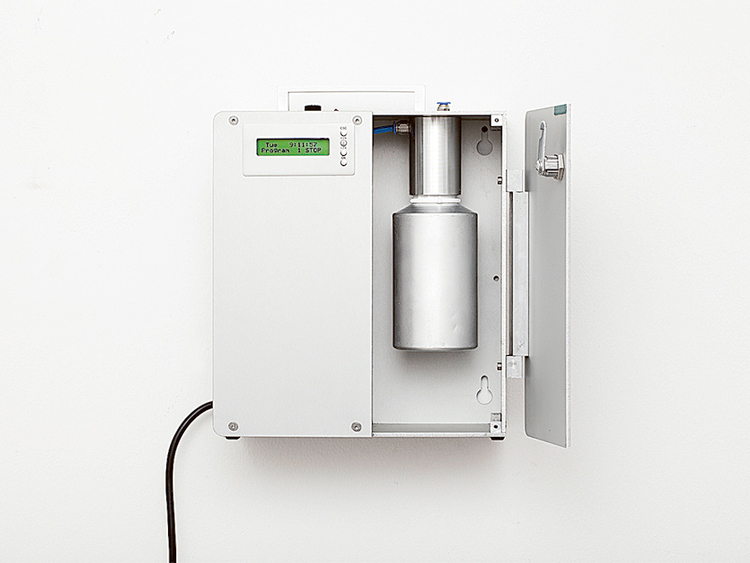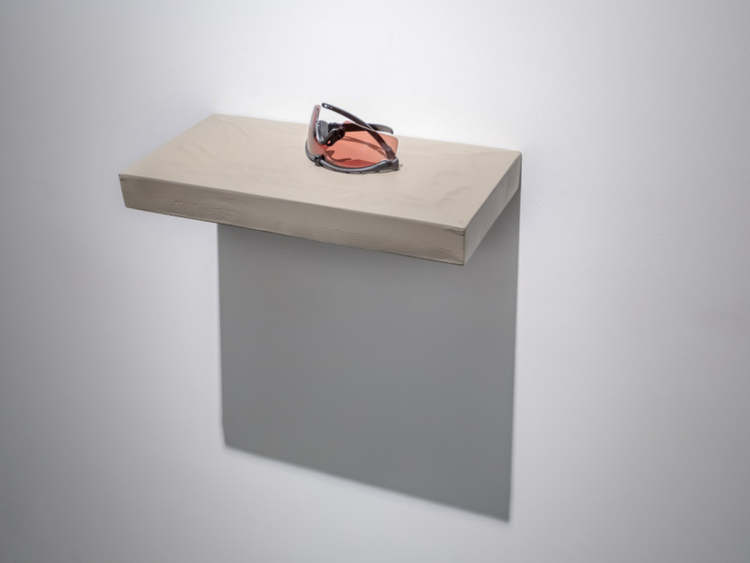
Raja’a Khalid has done a lot of research on significant events that happened in 1984. These include the landslide re-election of US President Ronald Reagan, and the eruption of a huge X-class solar flare on the surface of the Sun that caused radar disturbances and radio blackouts, which reportedly also affected the President’s flight. In the same year, Dubai began considering the feasibility of establishing an airline for the city, and Madonna released her number “Material Girl”, heralding the beginning of a global culture of materialism.
Khalid is interested in 1984 because it happens to be the year of her birth. The Pakistani artist was born in Saudi Arabia and grew up in Dubai, so her practice is focused on this region. For her first solo show, “Solar Flare, Always Red”, she has chosen the time frame of 1984 to the present to look at the changes that have taken place in this region and in the world, and to explore the region’s contemporary narratives of class, uber luxury and consumer culture. Through works that are inspired by mythologies of power, the aesthetics of consumerism and economies of desire, Khalid aims to subtly critique the region’s streaming motifs of soft power, alongside notions of wealth, masculinity, game, athleticism, desire and crypto-religiosity.
“When you arrive at Dubai airport, you see huge advertisements welcoming you to the ‘centre of now’. As an artist, I am interested in exploring what is this ‘now’, what it looks like, how do I get a piece of this, and how do I make work that is relevant to this ‘now’. My research indicates that the seeds of the new liberal culture of today were sown in 1984, hence my show features a collection of motifs and emblems that speak about the changes that have happened during my life on earth,” Khalid says.
The show’s title encapsulates this time span by referring to the solar flare of 1984, and the shade of red lipstick worn by the female cabin crew of Emirates airline, which was conceived in 1984 and is today one of the leading airlines in the world. In fact, the artist invited some Emirates air hostesses to come to the opening of her show. Although they were not dressed in their uniforms, they wore the official lipstick shade in a kind of silent performance connected with the show.
The works on display are eclectic, ranging from potted plants and designer sunglasses to a perfume diffuser and preserved palm leaves. But they are all connected by the underlying idea of soft power, expressed as machismo, style, luxury, exclusivity and aspiration.
The first work visitors encounter is “Bec” — a set of five carbon fibre, Fred Perrin La Griffe knives pushed into the wall. “Bec” is the French word for beak, and the work has the menacing look and feel of powerful birds’ beaks. Next is a collection of spiky, potted succulent plants, placed at the entrance to the gallery. These are commonly used in public landscaping in this region because they need very little water to survive. The title of the work, “XXX, XX, X”, refers to plant ratings that are based on the amount of water they require. Another work, “High Noon”, features five panels painted with an exclusive “colour flip” automotive paint that appears to change from red to orange to green.
“These limited edition, lightweight, super sharp, self-defence knives are designed by a former French commando, and they are highly sought after by men, especially football fans. I see them as representations of the idea of masculinity, sport and conflict — not just between people, but also between cultures, societies and economies. The plants are a visual motif of a dry, desert environment, but they are also guiding people into the exhibition space, reflecting how such landscaping is used in public places to direct people away from or around certain areas. The hot colours of the metal works reflect the desert, but the paint I have used is an expensive, luxurious car finish accessible only to the wealthy. These works are quite different, but they all represent change, exclusivity and aspiration in their own way,” Khalid says.
The two-tone effect of the car paint is also seen in a jacket, which is an unusual symbol of global power shifts. “This jacket is made from a fabric called Solaro, which was developed in the 1910s by a British company, and presented as a material that would protect light-skinned people living in the British colonies in the tropics from sun-induced nervous disorders. Although those claims were false, the company still produces the fabric, which is now valued as a fine suiting material,” Khalid says.
The idea of sport, power games, masculinity, and exclusivity is also conveyed through the imagery of falcons in a set of two photographs titled “Raptor”. The artist took the pictures in Abu Dhabi, inside one of the largest summer tents in the world, where falconers from the region leave their powerful, expensive, coveted pets to protect them from the heat. Similarly, a whiff of Tom Ford’s oud wood-based perfume, emanating from an industrial diffuser, also suggests the presence of masculinity, luxury and power. As do a pair of Oakley sunglasses.
“These are ballistic sunglasses designed by Oakley especially for American soldiers serving in the Middle East. The colour of the base on which I have placed the glasses is a shade called ‘desert sand’, which is the lightest colour in the American military’s camouflage uniform,” Khalid says.
Other works in the show include a series of seascapes, inspired by the TV series “Santa Barbara”, which began airing in 1984, and was about rich, stylish, powerful people set against a backdrop of sea, sun and palm trees; a crystal-studded car decoration inspired by a winged horse mentioned in Islamic lore, and a collection of embalmed palm leaves similar to ones found in malls and public spaces across the region.
“This show is about our aspirations in a contemporary materialistic society and about change. The winged horse Buraq, which has a religious connotation, is transformed into a bling car ornament; oud fragrance, which was once worn by people when going to pray at the mosque, is now part of consumer culture, and palm trees, which are an emblem of this region, are now being imported from abroad, embalmed to stay evergreen, and used for housing things such as surveillance cameras in public spaces,” Khalid says.
Jyoti Kalsi is an arts-enthusiast based in Dubai.
“Solar Flare, Always Red” will run at Grey Noise, Alserkal Avenue, Al Quoz, until January 7.















